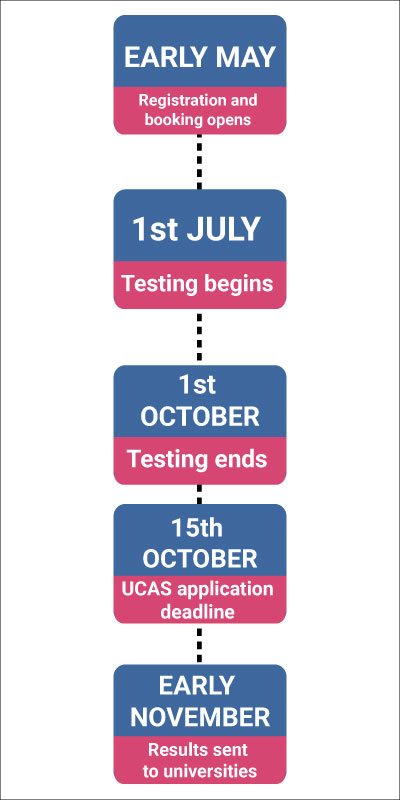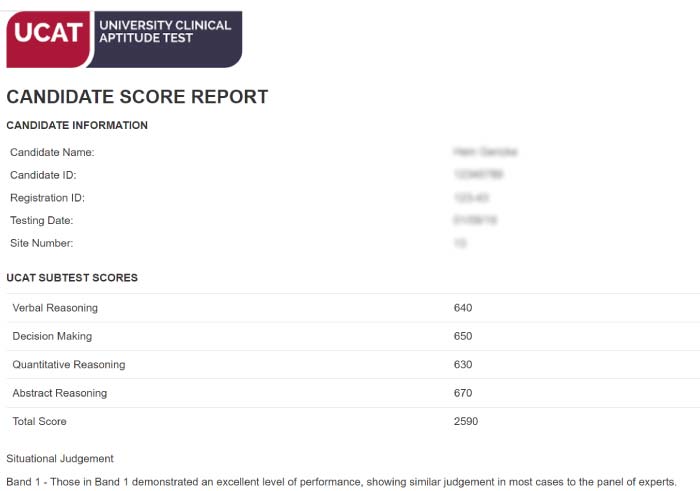Please be aware that the UCAT is undergoing major format changes in 2025. Primarily, the Abstract Reasoning Subtest will no longer be included in the exam. Please be aware of this when preparing for the UCAT and do not practice Abstract Reasoning questions as they are no longer relevant.
Hello and welcome to our guide on everything you need to know about the UCAT!
The UCAT is an important part of the Medical and Dental School application process and achieving a good score will make you more likely to get invited for interviews.
What is the UCAT?
The UCAT – or ‘University Clinical Aptitude Test’ – is an admissions test sat by students applying for Medical or Dental school in the UK. It is a mental aptitude test and therefore assesses your problem solving and critical thinking abilities, unlike the BMAT which primarily assesses your academic knowledge.
The reason the UCAT is included in the Medical and Dental applications process is because often, the majority of students will have extremely similar academic profiles, the same predicted grades and wonderful personal statements.
Due to this, over the years it has become more difficult for universities to compare students and, therefore, they have brought in extra measures to help differentiate prospective students.
The test consists of 4 sections which are all weighted slightly differently. These sections are:
That being said, doing well in the UCAT isn’t the be-all-and-end-all of getting into Medical or Dental school, if it doesn’t go as well as you’d hope on the day, you can make up for it through your Personal Statement and Interviews.

UCAT TUTORING BUNDLE
We've got all the support you need to score highly on the UCAT.
Prepare yourself for the UCAT with one-to-one tuition from a UCAT expert, as well as comprehensive resources, an expert preparation course and full access to UCAT.Ninja, available as soon as you sign up.
UCAT.Ninja
UCAT.Ninja
We've got all the tips and tricks you need to score highly on the UCAT.
Learn everything there is to know about the UCAT, with our UCAT Bundle and be guided by a tutor who scored in the top 10% – meaning you’re truly getting expert help.
Want to learn how to smash the UCAT, then this bundle is the one for you…


Which universities require the UCAT?
There are 30+ Medical Schools, and 15+ Dental Schools, in the UK which accept undergraduate entry, and all of these include the UCAT as part of their admissions process.
UCAT Universities
| University of Aberdeen | King’s College London* |
| Anglia Ruskin University | University of Leeds* |
| Aston University | University of Leicester |
| Bangor University | University of Liverpool* |
| University of Birmingham* | University of Manchester* |
| University of Bristol* | University of Newcastle* |
| Cardiff University* | University of Nottingham |
| University of Dundee* | Plymouth University* |
| University of East Anglia | Queen Mary, University of London* |
| Edge Hill University | Queen’s University Belfast* |
| University of Edinburgh | University of Sheffield* |
| University of Exeter | University of Southampton |
| University of Glasgow* | University of St Andrews |
| Hull York Medical School | St George’s, University of London |
| Keele University | University of Sunderland |
| Kent and Medway Medical School | University of Warwick |
*are also a Dental School.
You can find out more about how each university uses the UCAT with our UCAT University Guide!
Who needs to sit the UCAT?
If you’re hoping to apply for a medicine or dentistry course at a UK university, then you’ll most likely need to sit the test. Some universities used to ask for the BMAT instead of the UCAT, but the BMAT was discontinued in 2024, so all medical schools now require the UCAT instead.
Where is the UCAT test held?
Much like a driving theory test in the UK, you sit the UCAT at a Pearson Vue test centre. For those that haven’t sat their theory tests or are international applicants, Pearson Vue centres are controlled computer-based test centres.
The test venues ensure that you cannot cheat or get any external help. There are lots of these centres all over the UK (and internationally too) and you can usually travel to one without too much trouble.
How to register for the UCAT
The best way to register for the test is to follow the instructions from the UCAT website. They will take you to the Pearson Vue website where you can find your nearest test centre and follow the instructions for booking your test.
You’ll need to register and create an account with them. The UCAT website has the registration dates – make sure you do it before the deadline!
How to book the UCAT
Once you’ve registered, you’ll be sent a link with booking instructions. At this point, you’ll be asked to pay for the test (see the section below on the cost of sitting the exam). You’ll also be sent links for rescheduling or cancelling should you need to do it.
How much does it cost?
The cost of the UCAT varies depending on when and where you sit it. The UCAT website will have the details and is updated for each specific year. Generally, the test costs £70 if it is taken in the UK and £115 if the UCAT is taken outside the UK.
UCAT Exam Structure
As we briefly mentioned, the test itself is split into 5 sections.
Section 1:
- The aim of this section is to ‘assess the ability to critically evaluate information presented in a written form’
- It consists of 44 questions
- You are allotted 1 minute to read the section instructions, and 22 minutes to complete the questions
- You have approximately 28 seconds per question
Section 2:
- The aim of this section is to ‘assess the ability to make sound decisions and judgements using complex information’
- It consists of 35 questions
- You are allotted 1 minute to read the section instructions, and 37 minutes to complete the questions
- You have just over 60 seconds per question
- The aim of this section is to ‘assess the ability to critically evaluate information presented in a numerical form’
- It consists of 36 questions
- You are allotted 1 minute to read the section instructions, and 26 minutes to complete the questions
- You have just over 40 seconds per question
- This section is used to assess your understanding of real-world situations and how to deal with them
- It consists of 69 questions
- You are allotted 1 minute to read the section instructions, and 26 minutes to complete the questions
- You have just over 22 seconds per question
What to expect on the day
For those who have sat their driving theory test, the environment on the day will be familiar. If you haven’t, this is what will happen:
- On the day of your test, make sure to arrive 15 - 30 minutes before your start time to make sure everything is sorted out.
- Please don’t be late or they might say that you have to re-book your test for another day (and pay for it all over again).
- You’ll need to bring a photographic ID (passport or driver’s licence) as well as a printed copy of your booking confirmation.
When you leave the reception area to take the test, you’ll have to leave all of your things in a locker so try not to bring anything valuable like a laptop with you! It may be a computerised test, but computers are provided by the test centre. You’ll have to sign a document saying you won’t cheat, then you’ll be given a desk number to go to and get set up.
Once you finish the exam, you’re free to get your things and go. They will print out your results there and then before giving them to you, so don’t forget them!
UCATSEN
This is the test for students who would usually be allowed extra time in assessments and exams e.g. students with dyslexia. The time for this test is 25% longer than the UCAT (two and a half hours instead of two) and this time is spread across each section of the exam.
To sit the UCATSEN, you must apply for access arrangements with your initial application. The arrangements must be confirmed at least 10 days before you sit the test, so it’s really important to not forget to do this!

UCAT TUTORING BUNDLE
Looking to dramatically boost your UCAT Score?
When you sign up to 6med’s UCAT Tutoring Bundle, you’re getting access to world-class support for medical students who succeeded in the test!
UCAT Crash Course
UCAT Crash Course
Looking to dramatically boost your UCAT Score?
When you sign up to 6med’s UCAT Bundle, you’re getting access to live courses, video Masterclasses, an expert workbook and UCAT.Ninja, the world’s best UCAT preparation platform!
Does this sound like the perfect UCAT preparation support?


UCAT Key Dates
This page on the UCAT website will tell you all you need to know about dates. Below are rough dates for you to have in mind:


- Registration and booking opens – May
- Testing begins – Early July
- Testing ends – 1st October
- UCAS application deadline – 15th October
- Results sent to universities – Early November
It’s important to note that you’re only allowed to sit the UCAT once during each test cycle (i.e. each year). This means that whatever score you get, you’re stuck with it for this application cycle and can only re-sit the following year.
When booking your exam date, you want to make sure you have enough time to prep but also not leave it too late. Sitting it anytime in September or October means you have to juggle test prep with schoolwork and everything else going on with your university application, meaning it’s better to sit the test sometime over the summer. Obviously, it also depends on anything else you’ve got happening over the summer, but make sure you’ve got enough time to focus on it properly.
Applying strategically to medical school
You may want to apply strategically to Medical and Dental schools by taking your UCAT early so you have access to your results before sending off your UCAS application. This means you can compare your UCAT results with each of the Medical and Dental School’s UCAT cut off scores from the previous year. When applying to Medical and Dental schools, it is important to remember that cut off scores may vary each year and some universities place less emphasis on the UCAT as part of their entry requirements.
How is the UCAT Scored?
Sections 1 – 3 are all scored between 300 and 900 – this means that the lowest score you can get overall is 1200 and the highest is 2700. Each question is worth 1 mark. We have a guide on how to score highly on the UCAT which you should check out.
Be aware that the UCAT previously included a fourth subtest marked in this way – Abstract Reasoning. This was removed in 2025, so results prior to this year will consider four lots of results instead of three. This means you may see some results as high as 3600 in previous years, but this is no longer possible.
The situational judgement section is scored slightly differently. You rank answers from what you are most likely to do to what you are least likely to do in each situation. The questions are then marked by comparing your answers to that of a panel of experts (mainly doctors).
You will get the maximum number of points for having the same answer as these experts, you get some marks (but not full marks) for getting a reasonable answer but not the most appropriate one, and no marks for the least likely answer. These points are then added together, and you are given an overall band (1-5), with band 1 being the best and band 5 being the worst.
The best way to ensure success is through consistent practice. The more you practice, the more comfortable you will become with the exam format, and the better your chances of achieving a high score.
UCAT Results
You will be given a print-out of your test results immediately after you sit it. This is just so you know your own scores and can alter your application accordingly. You’ll also be able to see your scores online in the same account you booked the test through. The main thing to note here is that you do not need to submit your UCAT score to UCAS yourself, this will be done for you.

Resitting The Test
As we’ve mentioned before, the rules only allow you to sit the test once per application cycle. If you don’t do as well as you’d have hoped, don’t worry too much about it as you may still get offers from universities! If you don’t, then you’ll have to re-sit the test the following year.
How to prepare for the UCAT
Seeing as the UCAT is an aptitude test, it’s pretty hard to revise for it in the same way you would a normal exam. The test aims to assess your cognitive reasoning and problem-solving skills, which often can’t be learnt over a short period of time. That being said, there are lots of resources available for you to practise the types of questions that will come up. This can be extremely useful as you learn the general pattern of what answers are correct, as well as becoming familiar with the questions and sections themselves so that you feel more prepared on test day.
UCAT Tips
- Practise questions to time, so that you’re not caught out on the day! The timings are really strict and missing out questions can cost you a lot of marks.
- Learn the shortcuts! These will help you navigate the test, bring up the calculator and use the calculator much more effectively.
- Read each question carefully, there’s often information that may seem irrelevant at first glance but is actually very important.
- If in doubt or running out of time, try to make an educated guess rather than waste time desperately trying to find the answer you know is 100% right.
- For the situational judgement section, read the GMC guidelines on good medical practice.
- Once you’ve got your score, go back and have a look at the entry requirements for each Medical and Dental School and choose the ones who will accept you based on the score you’ve got!

UCAT TUTORING BUNDLE
We've got all the support you need to score highly on the UCAT.
Prepare yourself for the UCAT with one-to-one tuition from a UCAT expert, as well as comprehensive resources, an expert preparation course and full access to UCAT.Ninja, available as soon as you sign up.
UCAT.Ninja
UCAT.Ninja
We've got all the tips and tricks you need to score highly on the UCAT.
Learn everything there is to know about the UCAT, with our UCAT Bundle and be guided by a tutor who scored in the top 10% – meaning you’re truly getting expert help.
Want to learn how to smash the UCAT, then this bundle is the one for you…

